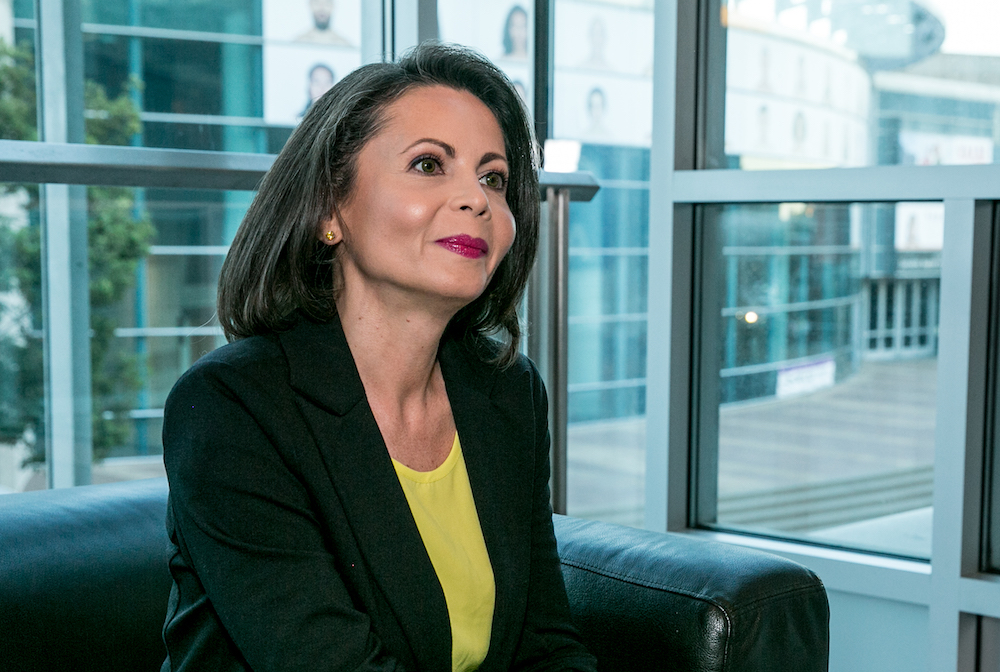
Photo by Sandoval Media/Hector Sandoval.
Julia Davis is a Ukraine-born film producer and founder of the Russian Media Monitor, which analyzes Russian state media in the broader context of the Kremlin’s propaganda. Before taking part in a Zócalo/Japanese American National Museum Event panel discussion titled “Can U.S. Democracy Survive Russian Information Warfare?” she spoke in the green room about playing with her cat, beach vacations, and the advice she got from her father.
You grew up in Ukraine, in Kiev?
Yes, I was born and raised in Ukraine during [the time of] the Soviet Union.
What was that like?
It was like an open-air prison colony, pretty much. So when I came to the U.S. it was like another planet, like a different world, in a great way—it was amazing. When I first landed in New York that was my first time in the U.S., and I couldn’t believe people were smiling. People would look at me and say hello and smile, and it was so foreign to me, but it was such a pleasant experience.
How old were you?
I was 22.
Once you were free of that “open-air prison,” did you imagine that you would devote your career to re-engaging with Ukraine?
I never planned on it, but I continued to love the people there, and always was bothered by the oppression of the Soviet Union. And now I find it very troubling that Russia is positioning itself into that revanchist stance. And so it felt like a very natural thing that, when the U.S. is under such an attack from that part of the world, that with the unique experiences and skills I have, and the language, that I jump in and try to do something about it.
What are you reading for pleasure?
I haven’t had much time to read lately, but mainly it’s been articles because the news cycle has been so insane. But I’ve been enjoying reading Gary Kasparov’s Winter Is Coming: Why Vladimir Putin and the Enemies of the Free World Must Be Stopped. And I read a lot of books about Russian disinformation.
What do you do to unwind?
I play with my cat, and I watch YouTube videos—except not the Russian propaganda videos. I watch a lot about traveling, about going to different countries, and it can be very relaxing. Especially anything to do with the beach. I like water vacations.
Where’s your next one?
Somewhere in the Caribbean.
If you could time-travel, where would you go?
I’d like to go to Russia right before the 1917 revolution, to see what that was like. But as far as living in a different time, I think we’re all born for the time we’re living.
Which aspects of Ukrainian culture have you preserved most in your life here?
Well, I still speak Ukrainian to my mom. And we love the traditional Ukrainian foods, for which there is no substitute. And just the general warmth of the Ukrainian spirit, the spirit of protest against corruption that’s been very strong in Ukraine but oppressed in Russia. I think that’s what separates the countries. You know, a lot of people question what’s the difference between Russians and Ukrainians, “Aren’t they the same?” But no, they’re distinctly different outlooks. And one of them is the willingness to give your life to oppose something that is wrong. That’s something that sets Ukrainians apart.
Do you have happy memories of Ukraine?
I certainly do. I had a very happy childhood, great parents, great friends. So in human terms it was all great; I have no complaints about that. But the regime itself, the way they wanted to control your every thought, your every feeling…. Like, when [communist] party leaders died we were obligated to cry or else you would get hit—things like that, just trying to control you.
Was there a teacher or professor, or perhaps another person, who really helped shape your career?
Actually, I think the best teacher in my life was my dad. My favorite lesson from him was, never accept something that somebody says, just because someone else says that this is so. Do your own research; come up with decisions on your own. And don’t [allow yourself to] be dictated to just because it’s a popular opinion. So I think that’s the lesson that I still use every day.
Which freedom is most important to you?
Freedom of speech, freedom of expression, and just the freedom to be who you are and have your own voice and be heard, and have it matter.



